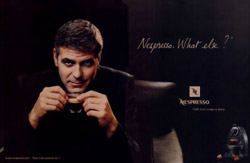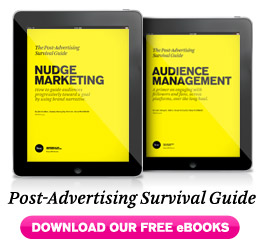 Why do I wince every time I see George Clooney advertise a coffee machine?
Why do I wince every time I see George Clooney advertise a coffee machine?
Nespresso’s latest advertising campaign, “What Else?” features Clooney in an interactive short-film. The campaign is well conceived, humorous, has high production values, involves the viewer and has storytelling at its heart. In truth, it’s so polished they almost pull it off.
So why do I wince? The same reason I cringe when Lewis Hamilton suggests I open an Abbey bank account. Why? Because they’re bullshitting me. Celebrity endorsement is the lazy way of creating a brand story. Yes, celebrities will get you attention, increase reach and foster a higher level of product recall but do they enhance credibility? Rarely.
As we keep rattling on about on this blog, it’s all about authority to publish. If Tiger Woods or Tony Hawk put their name to a golf or skateboard video game, I may well buy it. But what authenticity does George Clooney have as a coffee connoisseur or Lewis Hamilton as a financial expert? None!
That’s not to say celebrity endorsements are all bad, sometimes they really work. One of the best brand celebrity pairings ever documented being Givenchy and Hepburn. Hubert de Givenchy and Audrey Hepburn met on her first film, Billy Wilder’s Sabrina. Their partnership spanned many years, peaking in Breakfast at Tiffany’s, when Hepburn makes an entrance in a Givenchy black dress and over-sized sunglasses.
Thanks to Givenchy, Hepburn immediately became an icon and in return gave Givenchy the American market. So why did this endorsement so plainly work where Clooney and Hamilton fail? Because both parties were sincere. Like any good relationship, it was two-way and authentic. Hepburn felt completely indebted to Givenchy, crediting him with providing her with a look that gave her the confidence to act. “It was an enormous help to know that I looked the part, then the rest wasn’t so tough anymore.”
Brands are personifications and a superficial endorsement is like a superficial friend, people don’t fall for it for long.


